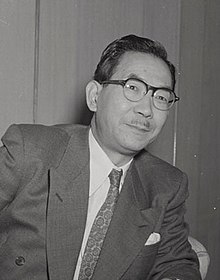Miki Takeo
Miki Takeo ( Japanese 三 木 武夫 ; born March 17, 1907 in Yoshida, Donari (today: Awa ); † November 14, 1988 ) was a Japanese politician and from 1974 to 1976 the 41st Prime Minister of Japan and chairman of the Liberal Democratic Party (LDP) .
Live and act
Miki studied at Meiji University and for several years at the University of California, Berkeley in the USA . In 1937 he was elected as the youngest member of the Reichstag and remained in parliament until he left in 1976.
As general secretary of the Kokumin Kyōdōtō party (国民 共同 党) he was communications minister from 1947 to 1948 and was then a member of the Kokumin Minshutō (国民 民主党) and the Kaishintō (改進 党) until he became secretary of the Liberal Democratic Party in 1956. In 1958 he became Minister of State and head of the Economic Planning Agency under Prime Minister Kishi , but his criticism of a law on police duties and the revision of the security treaty with the USA led to his resignation in 1959.
In the 1960s, Miki held important posts within the party and, although not a mainstream party leader, served as Minister of International Trade and Industry from 1965 to 1966 , and Minister of Foreign Affairs from 1966 to 1968. In 1968 and 1970 he was defeated by Satō in the election for party chairman and then in 1972 against Tanaka Kakuei . But he was deputy prime minister from 1972 to 1974 and took over the office after Tanaka resigned in December 1974. His base in the party was, however, weak, and so he only got into office because there were no interferences within the party at the time Ōhira and Fukuda could decide.
Miki with his announced “clean government” was initially very popular, but an attempt to reform the antimonopoly law failed due to opposition from the economy. He then angered party members by suggesting that the party donation system be made cleaner, and his party's right wing with his Korean policy. In particular, his attempt to bring the party on a cleaner line after the Lockheed scandal aroused strong opposition. Miki lost all support in the party, continued to fight, supported by public opinion, then resigned in December 1976.
Individual evidence
- ↑ S. Noma (Ed.): Miki Takeo . In: Japan. An Illustrated Encyclopedia. Kodansha, 1993, ISBN 4-06-205938-X , p. 960.
literature
- Hunter, Janet: Miki Takeo. In: Concise Dictionary of Modern Japanese History. Kodansha International, 1984. ISBN 4-7700-1193-8 .
Web links
| personal data | |
|---|---|
| SURNAME | Miki, Takeo |
| ALTERNATIVE NAMES | 三 木 武夫 (Japanese) |
| BRIEF DESCRIPTION | 41st Prime Minister of Japan |
| DATE OF BIRTH | March 17, 1907 |
| PLACE OF BIRTH | Yoshida, Donari (today: Awa ) |
| DATE OF DEATH | November 14, 1988 |
